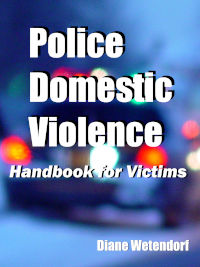Excerpt: Handbook for Victims
Diane Wetendorf, ©2000, 2006, 2014, 2020. All rights reserved. Available as an eBook from Books2Read.com

If your abuser is an officer of the law, you may be afraid to:
- Call the police — He is the police.
- Go to a shelter — He knows where the shelters are located.
- Have him arrested — Responding officers may invoke the code of silence.
- Take him to court — It's your word against that of an officer, and he knows the system.
- Drop the charges — You could lose future credibility and protection.
- Seek a conviction — He can lose his job and retaliate against you.
As the victim of a police officer, your situation is very different than that of other victims of domestic violence. If you have ever tried to get help, you may have become discouraged because no one seemed to understand your plight.
The Handbook covers the following topics:
- When your batterer is a police officer: As the victim of a police officer, your situation is very different than that of other victims of abuse. Focusing on your own survival means taking extraordinary steps to get back your life — regaining trust in your own thoughts, intuition, and your own gut feelings.
- Types of abuse: Abusive police officers use professional tactics of power and control in their intimate relationships. Not all abuse is physical violence. Lying, isolation, interrogation, surveillance, and weapons are also used.
- Breaking your isolation: Many of the safety options available to civilian victims may not be available to you. When you marry a police officer, you marry into the police family. Whether you can get help from his department depends on many factors.
- Orders of protection: It's important to weigh the advantages and disadvantages of obtaining an Order of Protection. Actions in civil or criminal court may be perceived as your word against that of a police officer. A domestic violence advocate or experienced attorney can help you explore your options.
- Counseling police domestic violence: Judges routinely order convicted batterers into counseling, but exceptions are often made for police officers. Domestic violence counselors can help you plan your own safety.
- Children of police officers: All children who see their father batter their mother share a world of conflicted emotions. Children in police families are no different — but they can't call the cops for help.
- Divorce and the family law system: It's important to choose an attorney who is not intimidated by your abuser being an officer. Custody and visitation issues are often used to intimidate and manipulate you even after the divorce.
- Surviving police domestic violence: The one thing your batterer fears is your discovery that you can make it on your own. Every step you take to protect your life, safety, and freedom takes away some of his power. Thousands of women have survived leaving abusive relationships. You are not alone.
Many survivors have purchased the Handbook and carry it with them. We suggest that you consider whether it is more safe for a family member, a friend, your advocate or attorney to order the Handbook and then give it to you.
Download your personal copy of the Handbook for Victims from Books2Read.com
Go to index